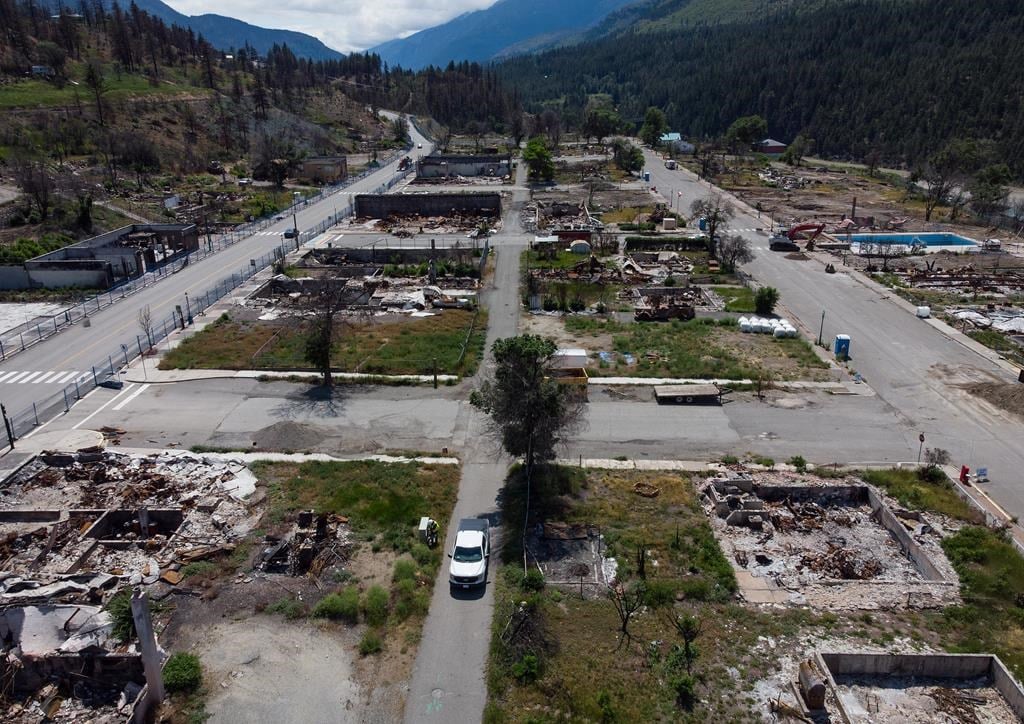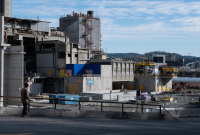Support strong Canadian climate journalism for 2025
Archeologists have uncovered thousands of artifacts, including a 7,500-year-old spear point, as they dig below what was Lytton, B.C., the village destroyed by fire in June 2021.
But for those who lost their homes and businesses in the village, that careful research has been one more roadblock to the rebuilding process, Lytton's Mayor Denise O'Connor said in an interview.
Lytton residents rallied on Wednesday in protest of repeated delays to rebuild their community.
"The question to government is what is your plan?" said Opposition BC United MLA Jackie Tegart, who represents the Fraser Canyon community in the legislature. "That's the question I ask every day."
The residents of Lytton have been waiting to rebuild their homes, but they face continuous delays and uncertainty, Tegart said.
"It's pretty sad when a community that has been out of their homes for over two years has to have a rally in their community to get government attention," she said.
Residents only learned about the discovery of the thousands of artifacts this week, Tegart said.
When the gold miners arrived in the area in 1858, they began building on the site of the Nlak'pamux First Nation village and its burial grounds, and as the village grew, the nation's history was lost or obscured.
The site is protected under B.C.'s Heritage Conservation Act.
On June 30, 2021, just one day after Lytton hit a Canadian temperature record of 49.6 C, a wildfire swept through the village, killing two people and levelling almost the entire community.
Lytton's council awarded a provincially funded contract in March 2022 to the consulting firm AEW for archeological and heritage monitoring. The firm was formed in 2017 by the Nlaka’pamux Nation Tribal member communities.
AEW said in a statement that rebuilding from the fire provides an opportunity to do things differently.
"With remediation now complete, the properties are in the process of being backfilled to the pre-remediation grade in preparation for rebuilding," said the consulting firm. "As the village enters the rebuilding phase, the Kumsheen Heritage Committee will assist property owners to understand their regulatory requirements to manage archeological sites," the statement said.
It said the "assertion that archeology has delayed the recovery and remediation is a false narrative based on misinformation," noting that the work has been done concurrently with recovery, remediation and backfilling.
Its monitoring has resulted in the recovery of more than 7,000 stone artifacts, and ancestral remains were also identified in four locations within the village, mostly within the burial ground mapped in 1860, AEW said.
"The mitigation and protection of the ancestors will be determined in consultation with Nlaka’pamux communities and the Nlaka’pamux Nation Tribal Council," the statement said.
"Acknowledging and respecting this heritage is also an important step on the path to reconciliation," it said.
Emergency Management Minister Bowinn Ma said the disaster that struck Lytton was unprecedented in that it hit the community from many directions.
"There was the total destruction of the entire town, including the municipal government's infrastructure, like buildings, bylaws, records, which greatly challenged the municipal government's ability to government following the crisis," she said in an interview.
"There was severe environmental contamination as a result of the fire, and, of course, the fact the village was built on top of an ancient Indigenous village and burial ground," said Ma. "All of these factors have culminated in a very complex rebuild process."
Lytton's mayor said residents recognize the area is of archeological and cultural significance to the First Nation.
"The people of the village of Lytton know that and respect that and don't deny that, but is there not some way that processes can be speeded up?" O'Connor asked.
She said in an interview Wednesday that the "straw that broke the camel's back" for residents came in a community meeting on Sept. 14 when resident Lilliane Graie said she had received a quote from AEW for the costs of digging a six-foot trench to put in service lines.
Graie told the meeting she was quoted $1,686 a day for the use of two monitors, and the project would likely take up to 10 working days.
Graie told the meeting she couldn't imagine how anyone in Lytton could afford the added costs.
O'Connor said Wednesday's rally,which was initiated by residents after that meeting, aims to raise awareness about the slow rebuilding process.
It also comes as other communities burned in more recent wildfires are already starting to rebuild, she said.
O'Connor said many residents in the community feel "totally neglected" since the fire destroyed their homes.
It took a "full year" to begin debris cleanup in Lytton and residents fear other communities will be rebuilt first, she said.
"It was an unprecedented event, and yet they seem to be going through a normal process for everything, like there seems to be nothing to expedite it for the people."
O'Connor said she was informed of the archeological findings on Tuesday when she watched video from the B.C. Legislature where Ma cited the figures.
"We were told it's all confidential (and) we wouldn't be told, so it was surprising to hear Minister Ma say that yesterday," O'Connor said.
Green MLA Adam Olsen said the situation in Lytton, especially now with the archeological discovery, highlights the government's previous delays in updating the province's Heritage Conservation Act.
"The archeological branch has quite frankly let Indigenous people down," he said.
BC United Leader Kevin Falcon said the delays in rebuilding Lytton must be sending waves of concern to residents in the Kelowna and North Shuswap regions who lost homes to wildfires this summer.
"What has gone on in Lytton ought to strike terror in the hearts of British Columbians everywhere," he said. "Eight-hundred-and-forty days later and none of the homes that the province has any responsibility over have been built yet."
Ma said she understands the concerns of the residents and their wishes to rebuild and return home.
"The devastation that happened in Lytton has been life changing for residents and recovery really can't happen fast enough for people who just want to get back home as soon as they can," she said.
This report by The Canadian Press was first published Oct. 18, 2023.




Comments